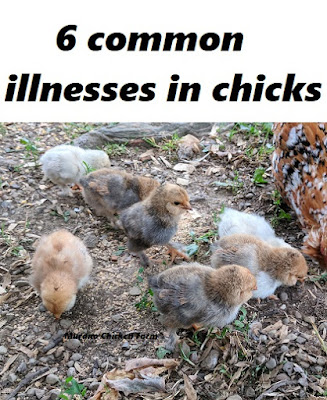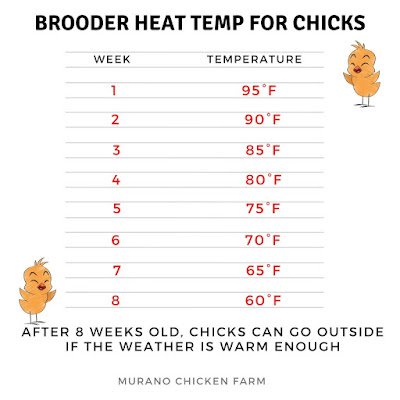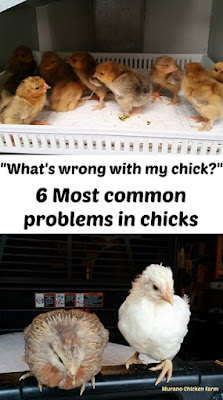I have spent more than my fair share of time worrying about the little feather balls, so I know how worried you must be!
It can be pretty upsetting when you don't know what's wrong with your chick. Luckily there aren't too many illnesses chicks can get so it's usually pretty easy to figure out what's wrong with your chick.
First of all relax, most chick issues are not your fault! Many are caused by genetics or nutritional deficiencies in the breeding stock.
The first thing you need to do when you notice a sick chick is to make sure they have everything they need in their brooder. You'll want to make sure chicks are not too hot or too cold.
If your chicks are a week old the brooder temperature should be around 95° at chick level, right under their heat source. You'll want to decrease this temperature by 5° a week as they grow.
Make sure their water is clean and not contaminated with food, bedding or chick poo. Make sure the food is dry and free from chick droppings also. If all that is ok, now we can move on to diagnosing an illness.
Common Chick Illnesses
Pasty butt in chicks:
when diarrhea like poop clogs up the chicks vent and prevents her from pooping it's called pasty butt . This can be fatal. Clean the chicks butt off under warm water. Do not pick off the dry poop clump as you will definitely pull out the feathers and might cause her delicate bum skin to tear.Soak it off gently. Dry, then apply olive oil to vent and bum to prevent poop from sticking. (do not use Vaseline)
Check that the brooder is an appropriate temperature. You should add probiotics to the chicks feed or give small amounts of plain yogurt with active cultures. Keep watch the next few days as it often takes a few days to go away. How to treat pasty butt.
Coccidiosis in chicks:
a parasitic infection of the digestive tract. Contagious. Can be fatal. Often indicated by reddish or bloody poop and the chicks standing, almost looking like they're cold. Many people give medicated chick starter to avoid this problem. If you choose to not feed medicated feed (I don't) add a little ACV to the chicks water to help prevent coccidiosis.If you suspect your chick has coccidiosis separate the affected chicks into a different brooder. Treat with Corid as detailed in this post on chick coccidiosis.
Shipping stress:
When a chick is stressed from the difficult process of being boxed up and sent through the mail for 2 days. You can add Sav-A-Chick to the chicks water when you first get them to give them an electrolyte and vitamin boost. Or add a little sugar or molasses to their water when you first get the chicks to give them a little calorie boost.
Don't ever give chicks honey as it can contain botulism spores which can be fatal to small chicks. Make sure they're warm and comfortable and don't handle them too much in the first few days till they get used to their new home.Spraddle leg or Splay leg:
When one or both legs slip out to the sides making a chick unable to stand or walk correctly. If this is not treated quickly it can become too late to fix it. However, if treated immediately, it can be cured in a day or two. All it takes to fix it is a bandaid. How to treat spraddle leg.
Crossbeak aka scissorbeak:
When the top and bottom beak do not line up properly. It can be anywhere from a mild misalignment to a severe deformity. Gently filing the edges with a nail file can help slightly.You'll want to give feed in a deep dish and the chick will learn to scoop their food instead of peck it. Feeding mash might help. With extreme deformity culling might be the kindest option. Do not breed the chick once it reaches adulthood. Crossbeak can be hereditary. Here's How to care for a chick with crossbeak.
Wry neck or stargazing:
When the neck bends to the side so the head is beside the body instead of straight up or the neck bends back so the chick is looking upwards (sometimes causing the chick to walk backwards) How to treat wry neck.Failure to thrive:
Sometimes no matter what you do a chick just doesn't thrive. Make sure she's not being picked on or kept out of the warm areas of the brooder and can access the feed and water. Feed her the mashed yolk of a boiled egg and add a little plain yogurt to it.
If she's being picked on and you have to separate her put another chick in with her to keep her company, it might help her perk up faster.
Bonus chick problem:
Chilling:
It sounds crazy to say something died of hypothermia when it's at what we think of as a comfortable room temperature, but that can easily happen to a chick. Chicks can get chilled and die when they get too far away from their heat source for too long.
This can happen for lots of reasons. They can get chased off by a bully chicken, confused or stuck behind something, can't find their mama etc. If you've ever let a guinea hen raise chicks, you'll often see a mama that walks away from her chicks. Thankfully chicken hens are usually better, but it does still happen...especially with first time mamas.
As shown in the chart up above, chicks need a much higher temperature than we do and it doesn't take long for them to get fatally chilled. If you find a cold, limp chick the first thing you want to do is warm it up! There is a medical saying that a patient is 'not dead till they're warm and dead' and that is quite accurate!
I can't even tell you how many times I found a chick that I was sure was dead and decided to pop it under the heat lamp or in the incubator for a few minutes only to have it start breathing and moving! If the chick is cold and limp give it a try. If the chick is starting to get stiff, it's definitely too far gone.
If you do find a chilled chick, try to figure out and fix why this happened. As mentioned above, pasty butt can be caused by incorrect brooder temps.
Sometimes no matter what we do a chick just doesn't make it. In these cases I try to learn from each one and move on. Thankfully the majority of the time all the chicks do just fine and grow up to be happy & healthy....then one day a year later I'm waking through the yard and start wondering "where did all these chickens come from?"
~L
Related reading: How to choose chicks by Timber Creek Farm
Want information on raising chickens sent right to your email weekly? Click right here to join my list and get new posts sent directly to you the day they're published ... plus, you'll also get the free download '25 Ways to save money raising chickens'.
I am not a veterinarian or other animal care professional nor do I claim to be. I am simply passing on information that has worked for me and my flock. This information is for entertainment purposes only and is not meant to treat or diagnose any medical condition. Please see a vet if your chicken is ill. Click for my full disclaimer.






We have been thinking about trying our hand at chicks. Thanks for the great information! It will help, if we ever get some! Visiting from the Homesteader Blog Hop!
ReplyDeleteThanks for this article! I've lost two chicks in the past three years---Pasty butt and the other one...I just have no clue. After reading this list (which was pretty eye-opening for me--about all the possible conditions chicks can have), I think it was probably just failure to thrive for my other baby. It's hard not to take chicks' deaths personally...
ReplyDeleteAwww, that's sad...but it's not uncommon. Don't be hard on yourself! Sometimes they just don't do well, especially if they were shipped. I had one with pasty butt for almost 3 weeks! Every time I got him cleared up, he got it again. He finally just died and I felt so horrible, but I think he just wasn't a healthy chick to begin with. It's sad but it happens.
DeleteHave a great week!
Lisa
Great list. This sort of information isn't shared enough with new chicken keepers. Great work!
ReplyDeleteThanks! I'm so glad that you found this list to be useful!
DeleteLisa
Thank you so much for what you do and what you share. Even though I've raised chickens for years your information is very helpful and comforting. J Ross
DeleteThanks for all these great tips. Also you have to war and clean their bums all their time until it clears up.
ReplyDeleteYes! You do, because some of them have it for a few days. Good point!
DeleteThanks for stopping by!
Lisa